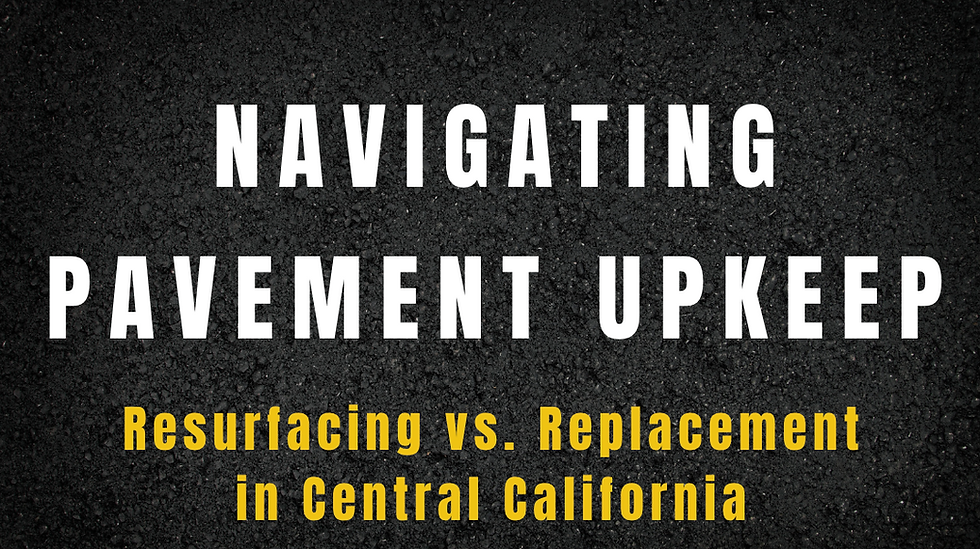Understanding the Science: What Causes Asphalt and Ground Damage?
- Central Coast Paving
- Oct 25, 2023
- 2 min read

Asphalt damage is a common concern for roadways, driveways, and parking lots. It not only diminishes the appearance and functionality of the surfaces but also entails costly and time-consuming repairs. In this blog, we delve deep into the science behind what actually causes asphalt and ground damage. By understanding the root causes and their mechanisms, effective strategies can be implemented to avoid such damage, ensuring the longevity and integrity of asphalt surfaces.
Asphalt damage is a common concern for roadways, driveways, and parking lots. It not only diminishes the appearance and functionality of the surfaces but also entails costly and time-consuming repairs. In this blog, we delve deep into the science behind what actually causes asphalt and ground damage. By understanding the root causes and their mechanisms, effective strategies can be implemented to avoid such damage, ensuring the longevity and integrity of asphalt surfaces.
Water Erosion
The Science:
Water is one of the most significant factors causing asphalt and ground damage. Rainwater, if not properly drained, can seep into the asphalt layers and the ground beneath, eroding the material and causing cracks, potholes, and eventual collapse.
Avoiding Ground Damage:
Ensure proper drainage systems are in place to channel water away from the asphalt surface. Regular maintenance to clear drainage pathways and repair any damage promptly is essential in preventing water erosion.
Temperature Fluctuations
The Science:
Temperature fluctuations lead to the expansion and contraction of asphalt, creating cracks and fissures. Cold climates, in particular, can cause the water within these cracks to freeze and expand, exacerbating the damage.
Avoiding Ground Damage:
Regular sealcoating can provide a protective barrier, minimizing the impact of temperature fluctuations on the asphalt. Proper material selection, designed for specific climate conditions, can also enhance the asphalt’s resilience to temperature changes.
Oxidation and UV Rays
The Science:
Exposure to sunlight and oxygen leads to oxidation, causing the asphalt to become brittle and prone to cracking.
Avoiding Ground Damage:
Again, sealcoating is a savior. It shields the asphalt from UV rays, preventing oxidation and preserving the flexibility and integrity of the asphalt surface.
Heavy Loads and Traffic
The Science:
Excessive weight and constant traffic can cause the asphalt to deform, leading to ruts, cracks, and other structural damages.
Avoiding Ground Damage:
Ensure the asphalt mix used is designed for the anticipated traffic load. Regular inspection and timely repairs of any damage can prevent further deterioration caused by heavy loads and traffic.
Chemical Spills
The Science:
Chemicals, such as oil and gasoline, can react with the asphalt binder, breaking it down and leading to surface softening and degradation.
Avoiding Ground Damage:
Immediate cleanup of chemical spills and regular cleaning of the asphalt surface can help prevent this type of damage.
Vegetation Growth
The Science:
Roots from trees and large plants can penetrate and crack the asphalt, causing significant structural damage.
Avoiding Ground Damage:
Careful planning of landscaping elements and regular inspection for signs of vegetation damage can prevent this issue.
In Conclusion:
A fundamental understanding of the science behind asphalt and ground damage is essential for effective prevention and maintenance. Proper construction techniques, regular inspection, prompt repairs, and protective measures like sealcoating can significantly enhance the durability and longevity of asphalt surfaces, preventing damage and ensuring optimal performance and appearance.
Invest in knowledge, quality materials, and diligent maintenance to safeguard your asphalt investment against the myriad of potential damages. Call Central Coast Paving to get your free quote on your next paving service at (805) 665-3292.




Comments